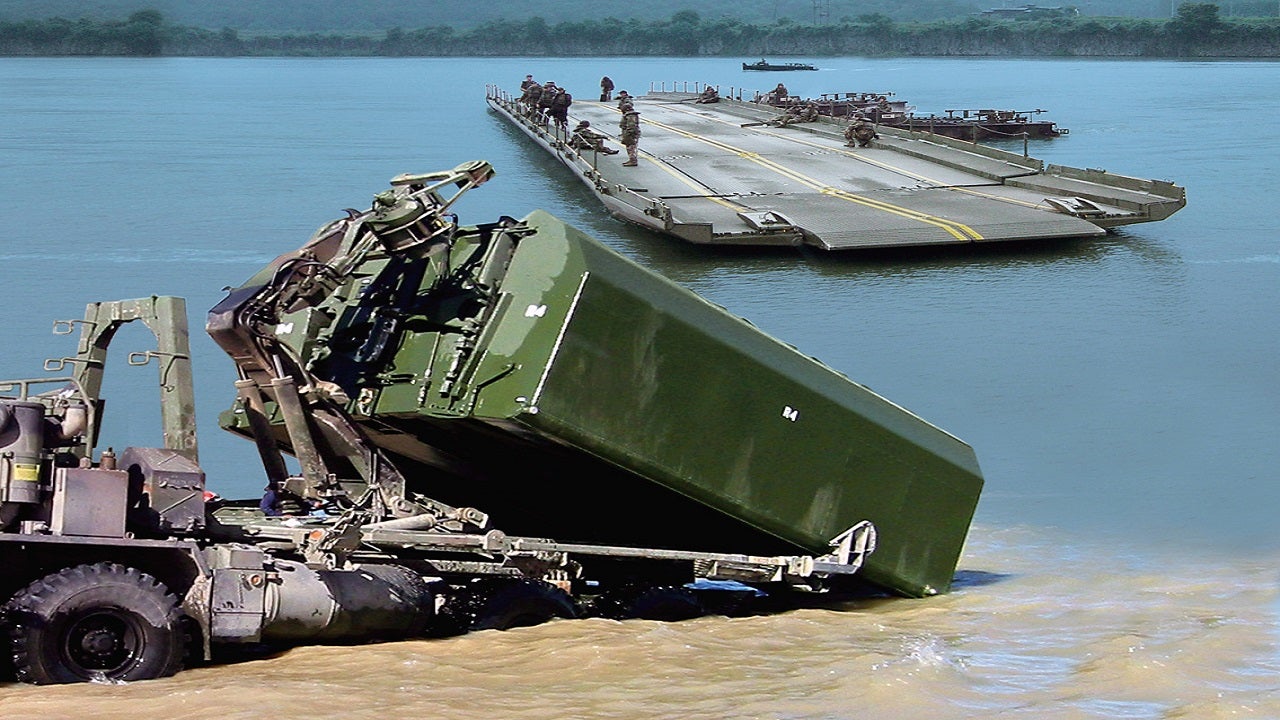Improved Ribbon Bridge (IRB) is a modern floating bridge system developed by General Dynamics European Land Systems (GDELS), a business unit of General Dynamics. It is designed to provide ground forces with the capability to transport heavy military equipment such as loaded heavy equipment transporter (HET), weapons systems, wheeled / tracked combat vehicles, trucks, suppliers and troops over rivers, and wet gap obstacles.
IRB entered service with the US Army in 2002 and is also operational with the Swedish Army, German Army and the US Marine Corps (USMC).
The bridge system has been deployed in intense combat operations with the US Army and the US Marine Corps since 2003.
Improved Ribbon Bridge orders and deliveries
The US Army Tank-automotive and Armaments Command (TACOM) awarded a $233m multi-year contract to GDELS (formerly Eisenwerke Kaiserslautern) for 541 interior bays and 218 ramp bays of the IRB in September 2007.
GDELS signed a contract worth $28m with the Australian Department of Defence for the production and supply of the Improved Ribbon Bridge, along with bridge bays, logistics package and training in November 2015. The contract was awarded as part of the Land 155 programme for enhanced gap crossing equipment.
New systems were intended to replace the Australian Army’s legacy Floating Support Bridge (FSB).
The Swedish Army took delivery of the initial batch of the IRB modules in November 2015. It performed internal trials in winter conditions to evaluate interoperability with in-service transport trucks, FSB and bridge erections boats.
The 7th Engineer Support Battalion of the USMC tested the IRB components in January 2016, and the Swedish Defence Materiel Administration (FMV) placed an order for the production and delivery of IRBs in January 2018.
GDELS signed a contract with the Brazilian Army Commission for the production and delivery of the IRB in June 2018. The company will provide trucks, bridge adapter pallets, a bridge erection boat, and integrated logistics support (ILS), in addition to the IRB. The first system was delivered in November 2019.
Improved Ribbon Bridge design details
The modular, foldable, aluminium bridge system can be used as a floating bridge and a multi-bay ferry. It consists of ramp bays and interior bays, which can be disassembled and transported on aircraft, helicopter, trucks and railway cars.
Both the interior and ramp bays have an overall length of 6.92m and a total weight of 6,350kg. The bays have a width of 8.63m and a height of 1.30m when unfolded. The ramp bay can reach bank heights of 2m.
The bridge module allows for transportation of loads up to military load capacity (MLC) 80 for tracked armoured vehicles and up to MLC 96 for wheeled vehicles and HET.
Improved Ribbon Bridge Features
The IRB features an improved folding and unfolding mechanism and non-skid surface. It is supplemented with improved splash plates to prevent flooding of the roadway. It is interoperable with GDELS’ M3 amphibious ferry system and FSB.
A truck-launched bridge erection boat (BEB) can be used to build and position bridging modules prior to vehicle crossing over shallow waters.
Performance of IRB
The IRB can be launched and recovered using all standard ribbon bridge (SRB) / FSB transport trucks, common bridge transporter (CBT) vehicle, as well as using 10t / 15t palletised load system (PLS) trucks through a bridge adaptor pallet.
The bridge can be laid with the help of a hydraulic system, which uses bio-degradable, non-inflammable fluid. A 100m bridge with 13 interiors and two ramp bays can be built in approximately 30 minutes.
It can be deployed under a variety of climatic conditions and is operable in water currents up to 3.05mps. It has a usable deck width of 6.75m for two-lane traffic for MLC 20 tracked / MLC 14 wheeled vehicles, and of 4.5m for single-lane traffic for MLC 80 tracked / 96 wheeled vehicles.
Contractors involved
US-based heavy vehicle manufacturer AM General provided logistics support for the IRB, while the BEB was supplied by FBM Babcock Marine.
In August 2009, Oshkosh Defense received a $26m order from the US Army Life Cycle Management Command (LCMC) to supply CBT equipment to support the IRB.




